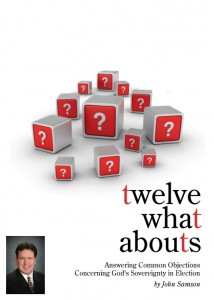 “Be careful of not making a Saviour of faith. There is a danger – and it cannot be too vigilantly guarded against – of substituting the work of the Spirit for the work of Christ; this mistake it is that leads so many of God’s saints to look within, instead of without, themselves for the evidences of their calling and acceptance; and thus, too, so many are kept all their spiritual course walking in a state of bondage and fear, the great question never fully and fairly settled, or, in other words, never quite sure of their sonship. The work of Christ is a great and finished work; it is so glorious that it can admit of no comparison, so complete that it can allow of no addition, and so essential that it can give place to no substitution. Precious as is the work of the Holy Ghost in the heart, and essential as it is to the salvation of the soul, yet he who places it where the work of Jesus ought only to be, deranges the order of the covenant, closes up the legitimate source of evidence, and will assuredly bring distress and uncertainty into his soul. ‘Righteousness, peace, and joy’ are the fruit of a full belief in the Lord Jesus Christ; and he who looks for them away from the cross, will meet with disappointment: but they are found in Jesus. He who looks away from himself, from his vileness, guiltiness, emptiness, and poverty, fully and believingly unto Jesus, shall know what the forgiveness of sin is, and shall experience the love of God shed abroad in his heart.
“Be careful of not making a Saviour of faith. There is a danger – and it cannot be too vigilantly guarded against – of substituting the work of the Spirit for the work of Christ; this mistake it is that leads so many of God’s saints to look within, instead of without, themselves for the evidences of their calling and acceptance; and thus, too, so many are kept all their spiritual course walking in a state of bondage and fear, the great question never fully and fairly settled, or, in other words, never quite sure of their sonship. The work of Christ is a great and finished work; it is so glorious that it can admit of no comparison, so complete that it can allow of no addition, and so essential that it can give place to no substitution. Precious as is the work of the Holy Ghost in the heart, and essential as it is to the salvation of the soul, yet he who places it where the work of Jesus ought only to be, deranges the order of the covenant, closes up the legitimate source of evidence, and will assuredly bring distress and uncertainty into his soul. ‘Righteousness, peace, and joy’ are the fruit of a full belief in the Lord Jesus Christ; and he who looks for them away from the cross, will meet with disappointment: but they are found in Jesus. He who looks away from himself, from his vileness, guiltiness, emptiness, and poverty, fully and believingly unto Jesus, shall know what the forgiveness of sin is, and shall experience the love of God shed abroad in his heart.
If, then, your faith is feeble and tried, be not cast down; faith does not save you. Though it be an instrument of salvation, and as such, is of vast importance, it is but the instrument; the finished work of Immanuel is the ground of your salvation, yea, it is your salvation itself. Then make not a Saviour of your faith; despise it not if it is feeble, exult not in it if it is strong, trample not on it if it is small, deify it not if it is great; such are the extremes to which every believer is exposed. If your faith is feeble and sharply tried, it is no evidence that you are not a believer; but the evidence of your acceptance in the Beloved, is to arise from Jesus alone; then let your constant motto be, ‘looking unto Jesus’; looking to him just as you are; looking unto him when faith is feeble; looking unto him when faith is tried; looking unto him when faith is declining, yea, looking unto him when you fear you have no faith. Look up, tried and tempted soul! Jesus is the Author, the Sustainer, and he will become the Finisher of thy faith. All thou wantest is in him. One glimpse, dim though it be, of his cross, – one touch, trembling though it be, of his garment, – will lift thee from thy lowest depths, lighten thy heaviest burthen, gild thy darkest prospect, and when thou arrivest at Jordan’s brink, will bear thee safely through its swellings, and land thee on the sunny and verdant shores of Canaan. Let this be your prayer, urged unceasingly at the throne of grace until it is answered – “Lord, increase my faith “; and then, with holy Paul, you too shall be enabled with humble assurance to exclaim, ‘I know in whom I have believed, and am persuaded that he is able to keep that which I have committed unto him against that day!'” – Octavius Winslow
 “In order for [Jesus] to qualify as our Redeemer, it was not enough for Him simply to go to the cross and be crucified. If Jesus had only paid for our sins, He would have succeeded only in taking us back to square one. We would no longer be guilty, but we still would have absolutely no righteousness to bring before God.”
“In order for [Jesus] to qualify as our Redeemer, it was not enough for Him simply to go to the cross and be crucified. If Jesus had only paid for our sins, He would have succeeded only in taking us back to square one. We would no longer be guilty, but we still would have absolutely no righteousness to bring before God.”
We would be free of guilt before God, but we would have no righteousness. This is what Christ merited for us in his life.
“Our Redeemer needed not only to die, but also to live a life of perfect obedience. The righteousness that He manifested could then be transferred to all who put their trust in Him. Just as my sin is transferred to Him on the cross when I trust in Him, His righteousness is transferred to my account in the sight of God. So, when I stand before God on the judgment day, God is going to see Jesus and His righeousness, which will be my cover.” – R. C. Sproul

 … a member of the Roman Catholic communion made the following comment:
… a member of the Roman Catholic communion made the following comment: I am looking forward to spending today with a TV/film production crew in Tucson, Arizona.
I am looking forward to spending today with a TV/film production crew in Tucson, Arizona.